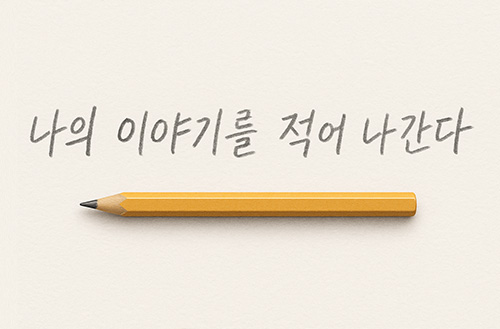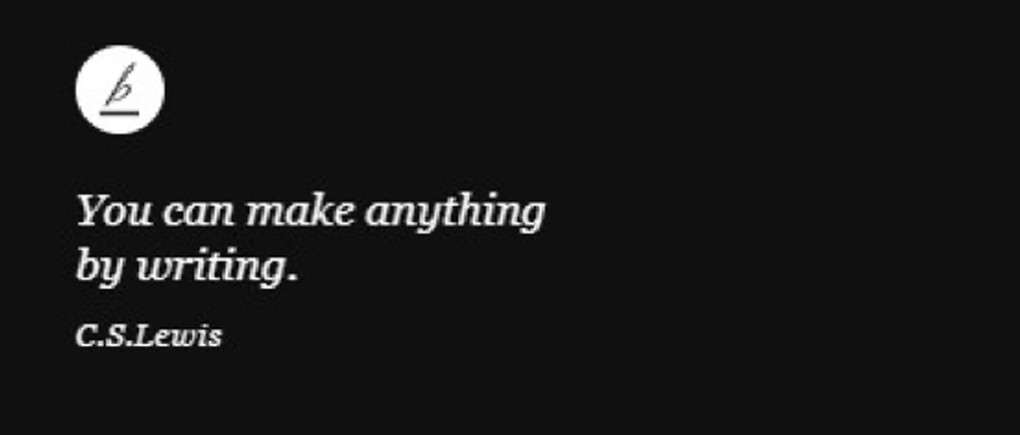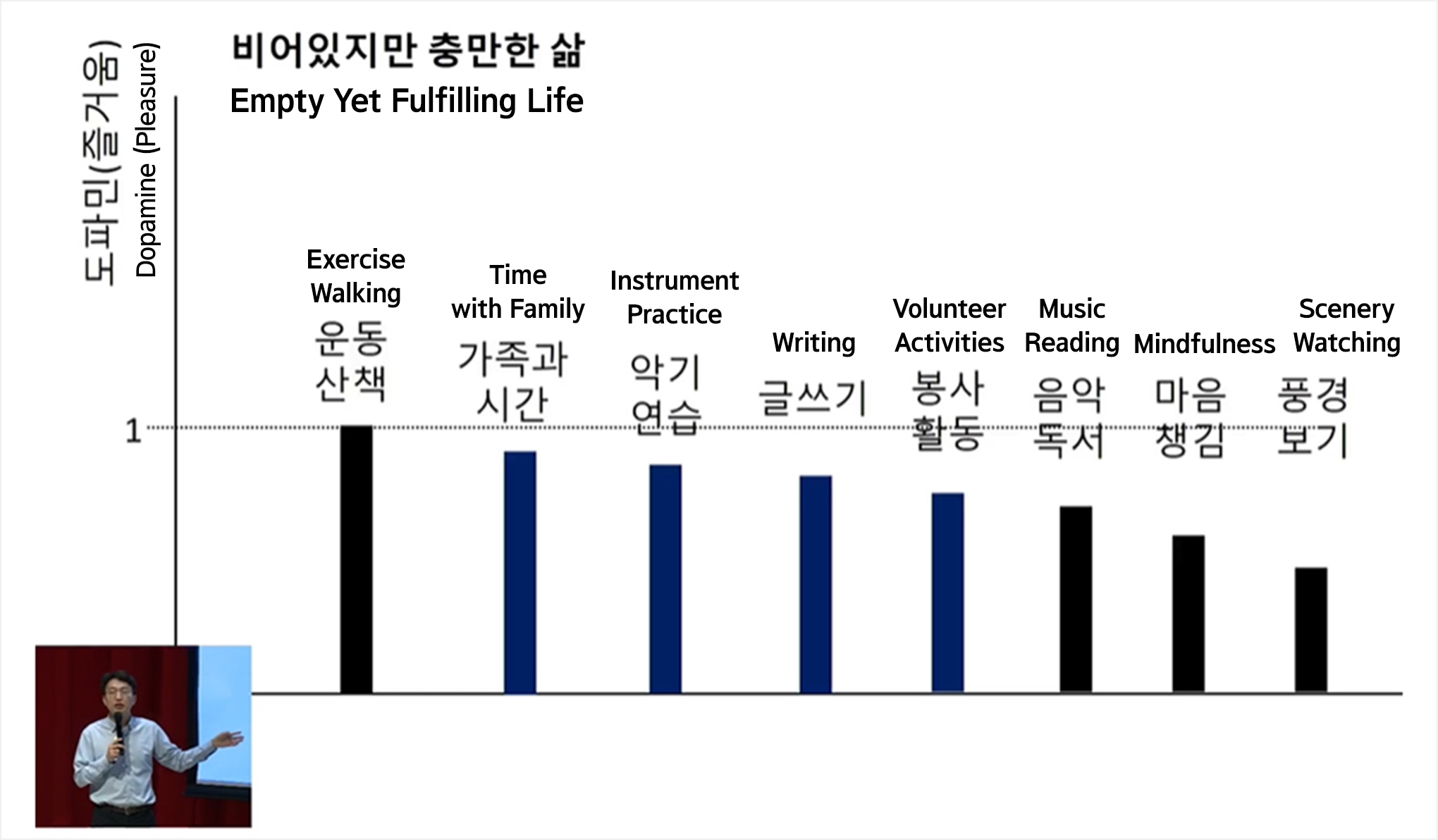

-
-
- 메일 공유
-
https://stories.amorepacific.com/en/amorepacific-thoughts-on-discovering-authenticity-through-writing
Thoughts on Discovering Authenticity Through Writing
On maintaining authentic thoughts and not losing them #2

Columnist
Yongjoo Na Innovation Management Office

#INTRO
Hello everyone. I’m Yongjoo Na from the R&I Innovation Management Center, joining you as a new columnist. I’ve always written about expanding and organizing my thoughts through personal experiences. Naturally, I’ve spent much time contemplating what makes me “me.” Through this opportunity, I’d like to share conversations with you, readers—sometimes from the perspective of an R&I researcher, other times as an ordinary colleague—going beyond my personal reflections. I hope my writing allows you to reconsider what makes you “you” and how to preserve that.
Asking questions ultimately comes down to ‘interest.’
How much interest do I have in myself? That’s where it starts. To ask yourself something, you need to have curiosity about yourself.
From fol:in-Marketer Soong Interview
1 The Efficacy of Recording My Own Story
I write. Quite frequently, in fact. I’m active as what they call a “writer” on an online platform called “Brunch Story” (everyone who writes there gets called a “writer”—I understand it, but it still feels like an awkward title). Over the past decade or so, I’ve published around 500 pieces. That averages roughly 50 per year, and since there are 52 weeks in a year, I’ve essentially been writing one piece consistently every week (that’s even more if you count drafts that didn’t make it to publication!). I’ve always thought my endurance wasn’t particularly high compared to others, but looking at this, maybe that’s not entirely true. I commend myself for running this marathon of writing without burning out.

Source: Brunch - Write about anything, a kind of Brunch spirit(?)
You’re probably curious about why I write. More importantly, why I believe, as the title suggests, that “writing is a good way to protect myself.” To put it simply, writing—especially personal writing—is a way of self-preservation:
‘Writing = Having a conversation with myself’
We live with ourselves until we die. Even those we love to death, we must eventually part from. So the one being who stays with us until that final moment is ourselves. How much do we know about this being? How much do we love them?
This means we shouldn’t only try to conform to others’ standards and tastes, but should also respect our own will and desires. We’re all living “our own lives,” and self-development is ultimately about trying to live better.
“Make the World Want What You Have”, Ina Choi
Conversing with yourself requires thoughtful questions, and these questions often begin with curiosity. It might feel burdensome to have conversations with yourself when talking to others is already challenging enough. But what can we do? As writer Ina Choi says, “I” is the being who stays with us until death.
How many times a day do you look into your own heart? The preciousness of time spent watching OTT(streaming) series with a cold beer after a grueling day of work, moments with music that comforts the soul, the emptiness we try to soothe with comfort food after work, even the time we lose ourselves in short videos to let our minds drift into thoughtless oblivion—all of this is precious and meaningful. I deeply empathize with the harmlessness of these moments. As someone with homebody tendencies, I cherish spending leisure time sprawled on the couch.
Beyond this, I also focus on listening to the voice within and transforming it into concrete language rather than letting it drift away. When I concentrate like this, even things that confused or angered me resurface. I don’t quite welcome these moments—unpleasant memories bring up emotions that are anything but pleasant. But when I start with the question “Why did that happen?” and organize my thoughts through writing, I discover opportunities to remind myself of insights I unconsciously gained from fleeting conversations with colleagues or friends, or realize I responded emotionally to situations that didn’t warrant anger.
Recording emotions has been beneficial for me. After pouring everything out in writing, facts and emotions naturally separate, and I can think more objectively about what made me happy, sad, or angry. Emotions are like waves—infinitely quiet when calm, but when they surge, they become powerful enough to be beyond self-control. In those moments, when I observe myself and the situation from a third-person perspective through writing, I realize I’ve been wasting precious emotions and energy on things that didn’t deserve such investment. Then I can brush it off, thinking, “Hmph, I unnecessarily poured my heart into something trivial,” and get back up.
Writing made things better. Not dramatically better, but better than before writing. Some of the chaos found peace again, and depression became waves suitable for surfing. Things that had been like active volcanoes became as modest as matchsticks. I blew out it with my breath.
“How Could I Not Write?”, Yunju Lee

Source: ChatGPT
Where did I find material when I first started writing? I mainly thought about people at work. I must sheepishly confess that most of my early pieces concentrated on complaining about my boss. But writing, you see, doesn’t stop at just venting and releasing emotions (though that is its primary function). From my experience, as the acts of writing, examining emotions, and reflecting on myself accumulated through repetition, self-objectification happened (relatively quickly). I became much better at recognizing similar types of situations or emotional attacks. Living through it all, I found that while there might be slight variations in approach, the content of conflicts tends to repeat. So when certain situations arise, I recognize them: “Hey, I’ve been through this before.” A kind of strategic judgment forms: “This is how I felt then, and this is how I should respond.” The efficacy of writing is in helping you recognize chances for hurt and, even if you do get hurt a little (you can’t avoid it entirely), dramatically reducing that level of damage.
2 The Meaning of Keeping Records as an Employee
I’ve long contemplated the importance of keeping records. There are so many excellent reports within our company. But I’ve always wondered: what process led to these results? Who thought of this idea and how, leading to proposals in this direction?
While there’s great pleasure in seeing success stories concisely summarized in good reports, I’m more curious about the painstaking efforts and history of challenges hidden behind them. The arduous buildup and feedback processes behind impressive proposals compressed and summarized into a page or two, the hidden stories, the inevitable accumulation of concerns and difficulties through revisions—these can only be discovered by those directly involved. Yet, looking around, I noticed most people don’t record these processes. If something didn’t go well, the person concerned wouldn’t want to expose it, and supervisors receiving reports would think, “Why are you reporting something that didn’t work?” Even for successful cases, only the final results remain. However, if we don’t record these processes, we can’t pass on the insights hidden within the journey to others, including the conclusions and the know-how. If we only think about “me,” that might be fine. However, when we consider “us,” the situation changes. My successes or mistakes (sometimes failures) can serve as guidelines for colleagues and others. Every year-end, I write my job description—what role I play and what competencies the role requires. It’s not something I report to my supervisor, but I expect it will be invaluable tips for my successor.
I’ve given plausible reasons, but who would remember every detail of our work? Ultimately, we must take care of our work, and the only official opportunity to leave records is through reports classified as “documentation.” Just like a company researcher’s reflections and routines can become a book, providing students with opportunities for indirect experience (that’s my story!), records about the “processes” of projects and tasks I’ve participated in will become invaluable guides for colleagues. I’m well aware that it’s bothersome, that there’s no time. Nevertheless, I’m certain: records overwhelm memory.
If you happen to be someone closer to an herbivore, try writing. American psychologist Elaine Aron created the concept of the Highly Sensitive Person (people who are very vulnerable to relational conflicts). Psychologist Jaehoon Choi, who runs a psychology center, defines these individuals as “people with sensitive perception, temperamentally closer to herbivores.” The noteworthy aspect here is “sensitivity”—not the sharp or irritable temperament we commonly associate with it. The sensitivity that personality psychology speaks of is somewhat different. It means accommodating others, making a conscious effort not to create conflicts, and avoiding behaviors that might be burdensome to them.
The career management method that psychologist Jaehoon Choi recommends for sensitive people is surprising: “Record your achievements.” These individuals find it difficult, by temperament, to confidently express themselves verbally in front of others. As a complementary method, he suggests using email to inform leaders about your work, not just simple results, but highlighting your contributions. The written material serves as an excellent means of conveying thoughts and opinions without having to assert your sensitive self.
3 My Story Isn’t Ordinary. It’s Special
Someone once asked me: in the AI era, when ChatGPT can write plausible text on request, what meaning could writing possibly have? I’ve sometimes thought the same thing. Once, after training it on my previous writings and giving it a topic to write about, it instantly produced results with a feel similar to my writing style and approach.
But I once read in a newsletter that LLM models, the foundation of generative AI, have the limitation of producing “average” answers. So-called sharp writing can never emerge. In contrast, even with a somewhat rough and clumsy style and expression, writing directly created by humans contains “authenticity.” While writing style can be similarly mimicked, generative AI writing is essentially “false” because it hasn’t directly experienced and felt. The words that director Bong Joon-ho quoted when winning the Academy Award for Best Director for “Parasite” resonate meaningfully: “The most personal is the most creative” (Martin Scorsese). We still need to focus on writing that reveals the true self within us.

Source: Excerpt from Professor Heewon Jung’s Slow Aging Lecture (YouTube) - Activities that, while providing small amounts of dopamine, have efficacy for a fulfilling life
#OUTRO
In Professor Heewon Jung’s lecture on slow aging, the part emphasizing the usefulness of writing was impressive. If we consider slow aging as extending beyond just what we eat and apply it to everything surrounding us, mental management can never be overlooked. As someone who has experienced the efficacy of writing in maintaining mental stability, I strongly recommend it to you. Along with physical aging, let’s also take care of cognitive aging.
The next piece will be a story about “authentic research perspectives” that came to mind during a chance conversation at an overseas dermatology conference. See you next time!
-
Like
0 -
Recommend
0 -
Thumbs up
1 -
Supporting
0 -
Want follow-up article
0





